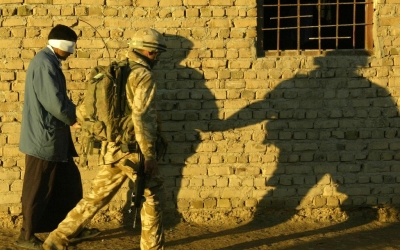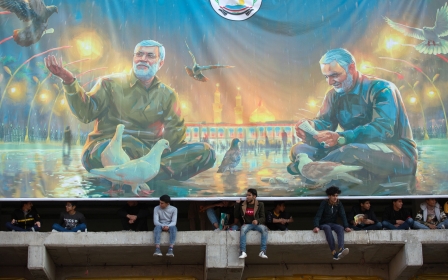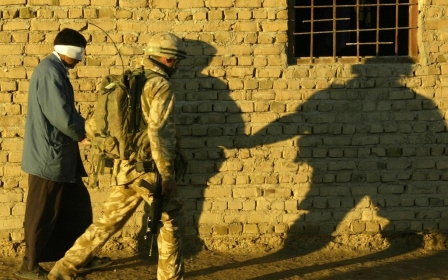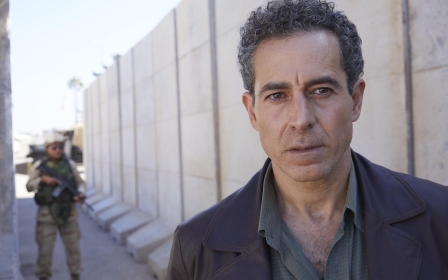Donald Rumsfeld, US defence secretary who oversaw 2003 invasion of Iraq, dies
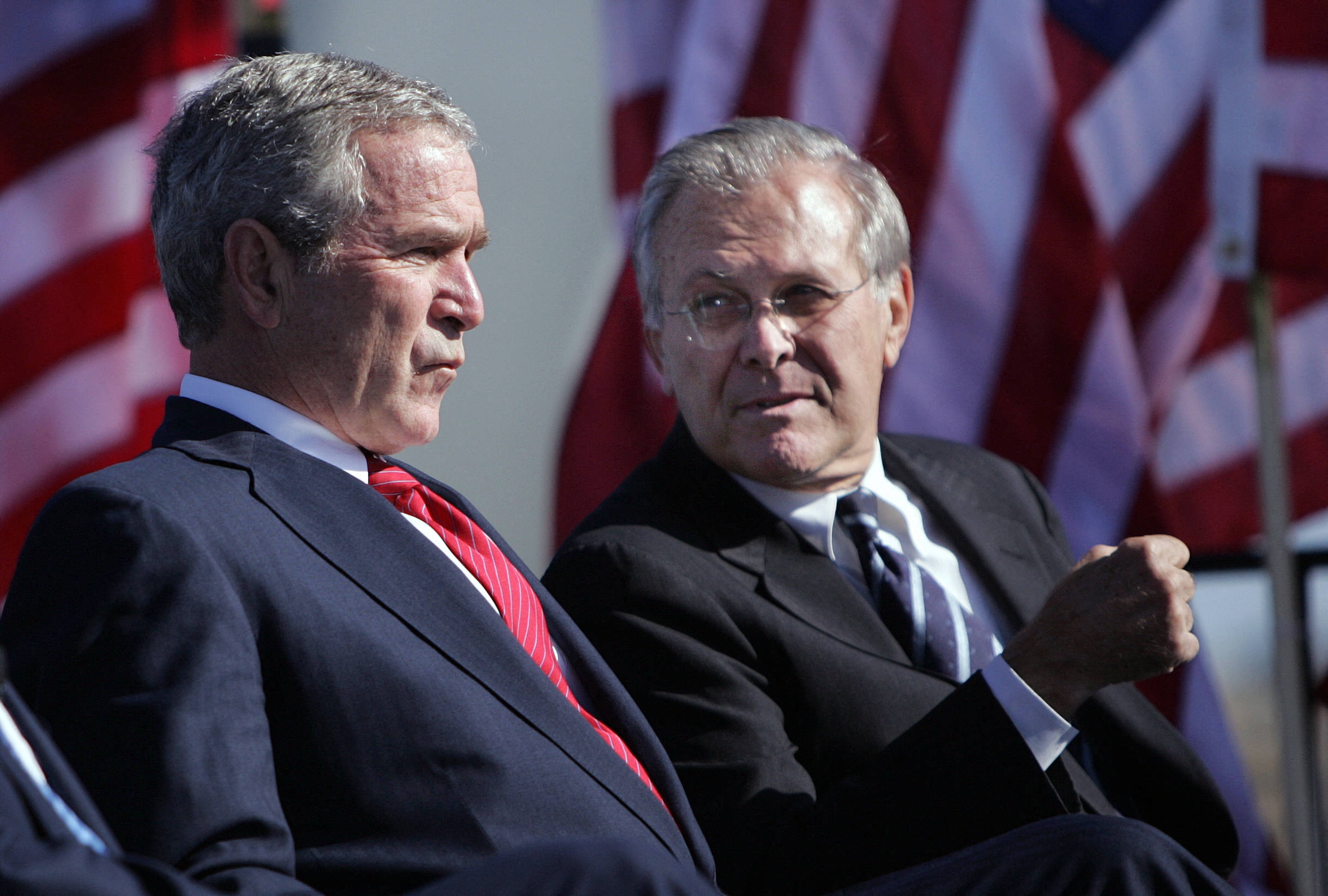
Donald Rumsfeld, the former US defence secretary who oversaw the invasions of Afghanistan and Iraq, died on Wednesday at the age of 88.
Rumsfeld's family said in a statement on Twitter that he died surrounded by his family in Taos, New Mexico.
"It is with deep sadness that we share the news of the passing of Donald Rumsfeld, an American statesman and devoted husband, grandfather and great grandfather," the family said.
"History may remember him for his extraordinary accomplishments over six decades of public service, but for those who knew him best and whose lives were forever changed as a result, we will remember his unwavering love for his wife Joyce, his family and friends, and the integrity he brought to a life dedicated to country."
Rumsfeld, who served in the Republican administrations of Presidents Gerald Ford and George W Bush, oversaw the 2001 invasion of Afghanistan and the 2003 overthrow of former Iraqi strongman Saddam Hussein.
New MEE newsletter: Jerusalem Dispatch
Sign up to get the latest insights and analysis on Israel-Palestine, alongside Turkey Unpacked and other MEE newsletters
Two decades on, Afghanistan remains mired in conflict with the Taliban controlling large swathes of territory, and several thousand US forces remain stationed in Iraq. More than 150,000 Afghans have died in the fighting.
Saddam and WMDs
In 1983 Rumsfeld was sent by the US Reagan administration as an envoy to meet Saddam and offer US support in its war with Iran that followed the Islamic revolution of 1979. Rumsfeld later claimed he had warned Saddam against using banned weapons - Iraq was routinely using nerve gas against Iranian troops.
Yet the US enabled the export of biological agents, including anthrax, key ingredients for chemical weapons, and cluster bombs sold by a CIA front organisation in Chile, a 1994 congressional inquiry found.
Following the 9/11 attacks, Rumsfeld became one of the primary architects of the US invasions in both Afghanistan and Iraq.
Between October and December 2001 the Bush administration launched attacks on the Afghan Taliban regime for sheltering former al-Qaeda leader Osama bin Laden.
During this period, Rumsfeld also played a leading role in making the case for the March 2003 invasion of Iraq.
But even before 9/11, Rumsfeld had argued in February 2001 that ousting Saddam would "demonstrate what US policy is all about", and aid in transforming the Middle East.
In July 2001, he would claim that "within a few years the US will undoubtedly have to confront a Saddam armed with nuclear weapons" and that Iran will "almost certainly" have nuclear weapons by 2006. As of July 2021, Iran does not possess nuclear weapons.
Advocates of war in the Bush administration had claimed that Iraq had developed weapons of mass destruction (WMDs), and that Hussein was capable of making them available to organisations such as al-Qaeda, putting the US at imminent risk.
After more than three and a half years of fighting in Iraq, Rumsfeld was fired by Bush in 2006, with US troops bogged down in the long and costly war.
The Bush administration's stated reason for going into Iraq - that Hussein possessed WMDs and was harbouring militants linked to the 9/11 attacks - turned out to be false.
Despite this, during his farewell address at the Pentagon in December 2006, Rumsfeld issued a defiant speech in which he warned against hoping for "graceful exits" from Iraq.
"A conclusion by our enemies that the United States lacks the will or the resolve to carry out our missions that demand sacrifice and demand patience is every bit as dangerous as an imbalance of conventional military power," he said.
"It may well be comforting to some to consider graceful exits from the agonies and, indeed, the ugliness of combat. But the enemy thinks differently."
Sectarian bloodshed, massacres, human rights abuses, and militant attacks on civilians would haunt the oil-rich country for years.
No regrets
Still, Rumsfeld's views never changed. In his 2011 memoir Known and Unknown, he continued to express no regrets over the decision to invade Iraq, which cost more than 4,400 American lives.
"Knowing what we later learned and recognizing the costs, there is not a persuasive argument to be made that the United States would be in a stronger strategic position or that Iraq and the Middle East would be better off if Saddam were still in power," he wrote.
"In short, ridding the region of Saddam's brutal regime has created a more stable and secure world."
In 2008, Nobel Prize-winning economist Joseph Stiglitz and Harvard University's Linda Blimes put the cost of the Iraq war at roughly $3tn, or about 60 times what the Bush administration first said it would cost.
The number of deaths caused by the Iraq war has been a source of intense controversy, with one study released in 2013 putting the figure at close to 500,000.
The conflict also became a magnet for al-Qaeda, who eventually rebranded themselves as the Islamic State (IS) group, wreaking havoc in Iraq and Syria and waging attacks against civilians across the world.
Use of torture
As defence secretary during the so-called "War on Terror", Rumsfeld also authorised the use of 20-hour interrogations, the use of phobias and stress positions against prisoners and terror suspects.
These and other techniques came to be known as "advanced interrogation" and were determined to be torture by scholars and experts.
Moazzam Begg, a former Guantanamo Bay detainee and director of outreach for the UK-based campaign group CAGE, said that at the US airbase in Bagram, Afghanistan, "US soldiers would shackle our wrists to the top of the door and leave us for hours."
"In 2002, I witnessed the murder of two prisoners made to stand like this," he added.
A memo in 2002 which detailed how interrogators at Guantanamo Bay forced prisoners to stand for four hours at a time was challenged by Rumsfeld.
"I stand for 8–10 hours a day. Why is standing [by prisoners] limited to four hours?" he wrote.
A 2008 report from the Senate Armed Forces Committee placed much of the blame for the US use of torture tactics on Rumsfeld and other senior officials, Reuters reported at the time.
Iyad el-Baghdadi, president of the Kawaakibi Foundation, a research and activist group focused on liberty in the Arab world, said: "Rumsfeld was a war criminal who presided over illegal wars that involved wholesale massacres of civilians, systemic torture and plunder, and massive corruption."
According to a Department of Defense (DOD) bio, when Rumsfeld became secretary of defense for the second time under Bush, he was the CEO of two Fortune 500 companies.
Middle East Eye delivers independent and unrivalled coverage and analysis of the Middle East, North Africa and beyond. To learn more about republishing this content and the associated fees, please fill out this form. More about MEE can be found here.


